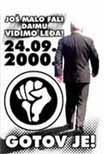Victory - but for whom?
Two days ago a friend of mine asked me what did I really expect
would happen in Serbia. I said: Kostunica would get more votes,
but both him and Milosevic would claim victory, and Milosevic
would remain president. At least, the elections did develop along
that highly predictable pattern.
The numbers reported by various sources are all different and they
differ so much that makes reporting them useless and irrelevant.
The total voter turn-out reports vary from 58% (SPS site) to 78%
(DOS and New York Times site). Serbian opposition claimed
sweeping victory of Kostunica over Milosevic even in his hometown
of Pozarevac. The regime at one point (around 3 am) conceded to
losing elections on its web page - but that report was promptly
removed and an older one reflecting Milosevic's winning (that
includes reports only from Kosovo and Montenegro polling sites)
was put back up.
 The numbers would then look like this:
The numbers would then look like this:
At 3.55% of counted votes Milosevic leads 42:41(as reported by
the official SPS election site - that is mostly Kosovo vote -
ironically but fully expected the biggest support Milosevic won was
in NATO controlled Kosovo; this number also includes 92% who
voted for him of 5% total voters in Montenegro - where the total
reported turn-out vary between 20-25%).
At 12.69% of counted votes Kostunica leads 44:41 (that report was
posted and then removed from the official SPS election site).
At 37% of counted votes Milosevic is in the lead 45:42.
At 60% of counted votes Kostunica leads 54:34 (the latest report
on the Serbian opposition web site).
At this point, without disclosing the percentage of counted votes on
which that number is based, the regime is content with reporting a
victory over Kostunica 44:41, hinting that Milosevic may be willing
to accept the second round of elections on October 8, something
the regime previously thought unthinkable.
It is indicative that the only places where everybody agrees that the
opposition lost are Kosovo - with NATO in charge, and Montenegro -
where the Djukanovic's pro-western government boycotted
elections.
 It is also indicative that while 'local independent observers' cry foul,
the foreign observers (from 52 countries, including NATO countries) claim
that elections were carried in dignified, democratic and fair fashion.
Some critics in the West point out that 'local independent observers' are
not really independent, since they are financed indirectly by the Western
governments (as it was admitted recently in the New York Times article),
which are partisan in wanting to oust Milosevic. On the other hand the
observers from 52 countries admitted to Belgrade are generally those who
belong to marginal leftist organizations or rogue states that for various
reasons support Milosevic's regime.
It is also indicative that while 'local independent observers' cry foul,
the foreign observers (from 52 countries, including NATO countries) claim
that elections were carried in dignified, democratic and fair fashion.
Some critics in the West point out that 'local independent observers' are
not really independent, since they are financed indirectly by the Western
governments (as it was admitted recently in the New York Times article),
which are partisan in wanting to oust Milosevic. On the other hand the
observers from 52 countries admitted to Belgrade are generally those who
belong to marginal leftist organizations or rogue states that for various
reasons support Milosevic's regime.
Essentially, the elections passed without violence so far, which is
a good sign. The attempts of Milosevic's regime to manipulate the
results are obvious and expected. There is also a hope on the part
of regime that people are going to get exhausted and tired by the
second round and its aftermath, which may be a bad bet. There is
a hope on the part of opposition that a lot of Milosevic sycophants
are going to get wary and scared of following their beloved leader in more
dire straits, and that they are going to turn their backs on him next
month - that wager might be a good one, but it remains to be seen if it
was.
Reports: SPS & DOS

 The numbers would then look like this:
The numbers would then look like this: